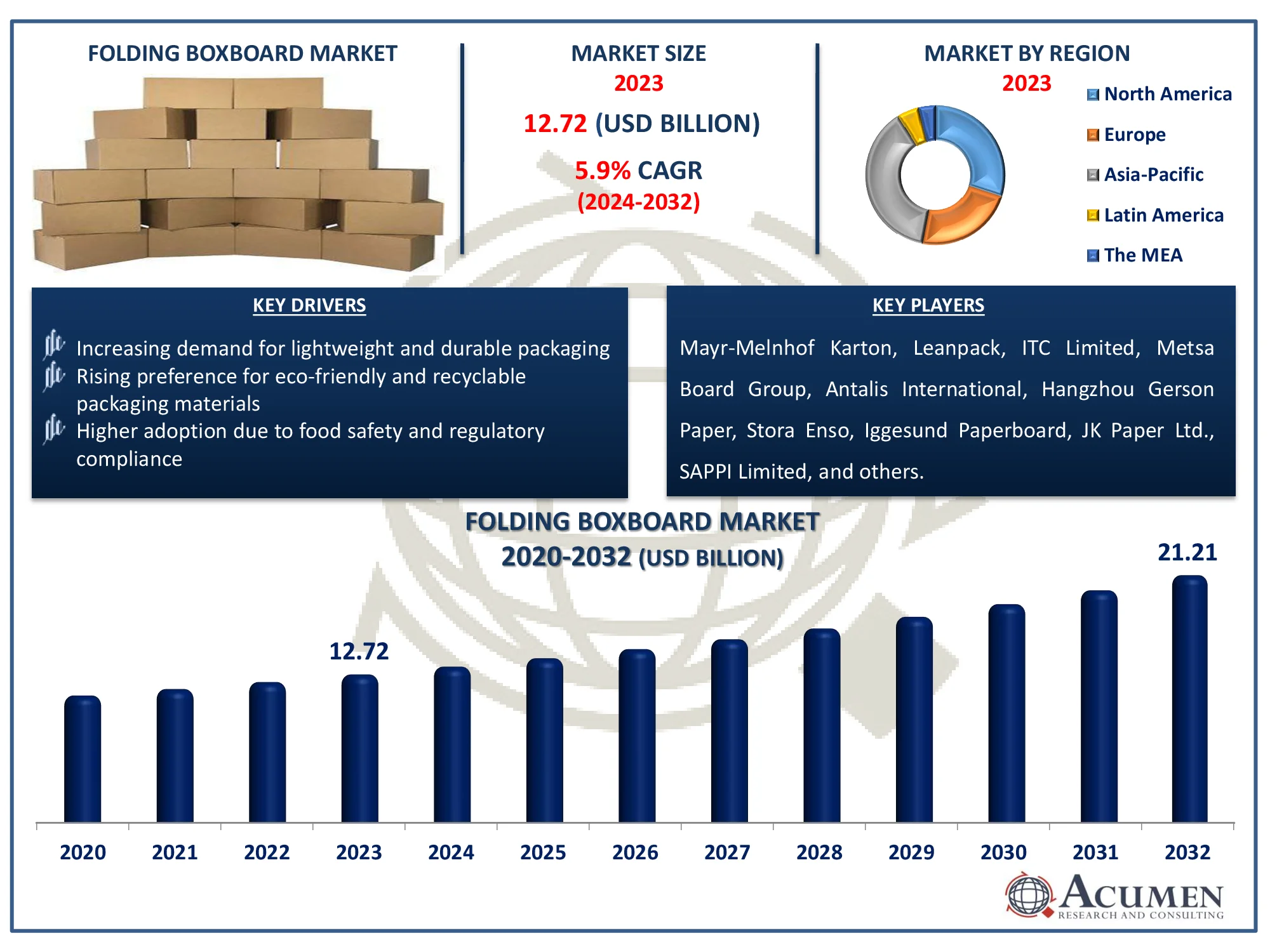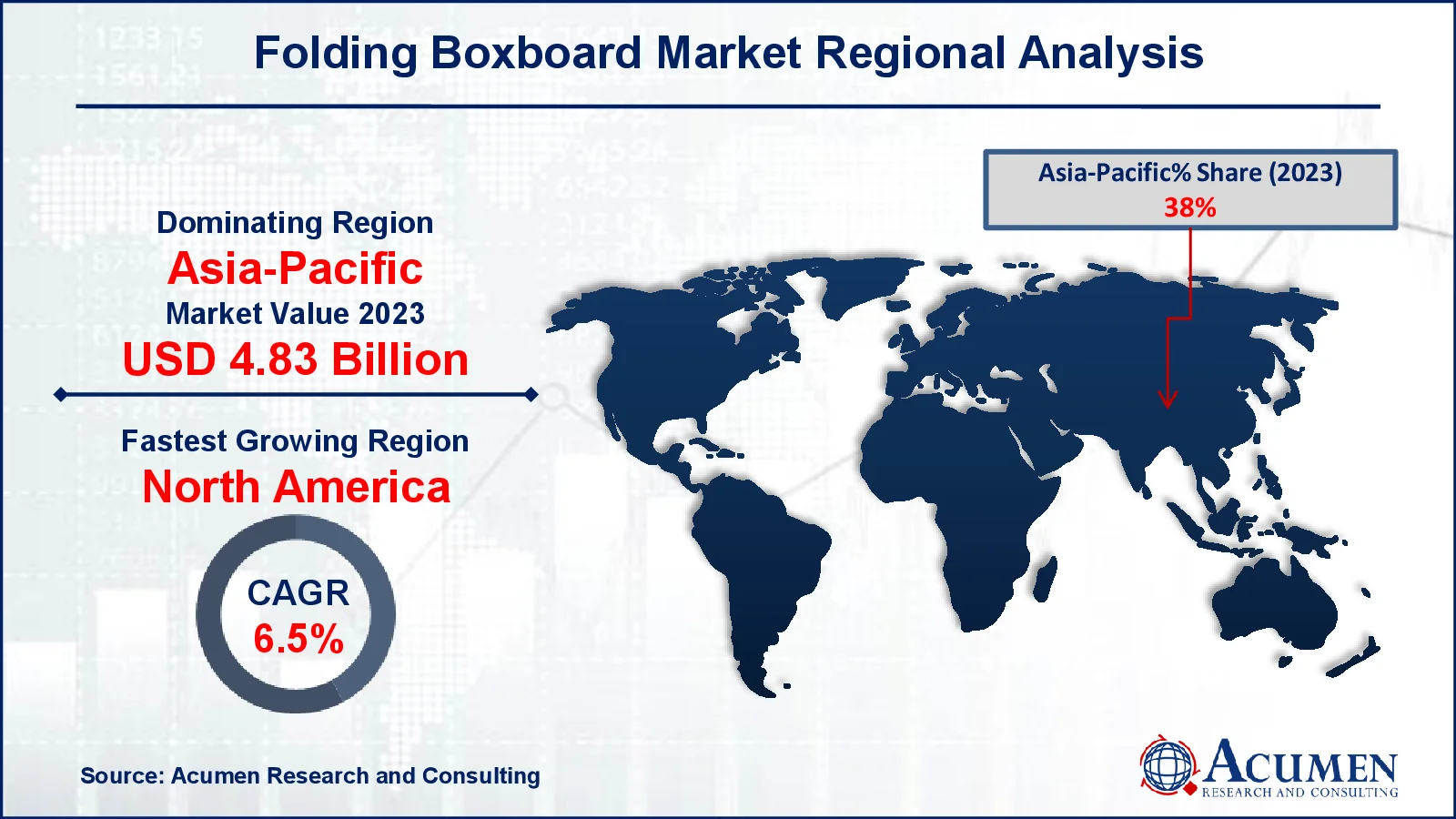October 2023
The Global Folding Boxboard Market Size accounted for USD 12.72 Billion in 2023 and is estimated to achieve a market size of USD 21.21 Billion by 2032 growing at a CAGR of 5.9% from 2024 to 2032.
The Global Folding Boxboard Market Size accounted for USD 12.72 Billion in 2023 and is estimated to achieve a market size of USD 21.21 Billion by 2032 growing at a CAGR of 5.9% from 2024 to 2032.

Folding boxboard is a specialized packaging material made from layered bleached pulp using both chemical and mechanical processes. It is a cost-effective, lightweight, durable, and efficient solution for food packaging. According to EU guidelines, the use of optical brighteners, including fluorescent dyes, is allowed in paperboard coatings for food packaging. Widely used for various shelf products, its thickness varies depending on the weight of the packaged item.
|
Market |
Folding Boxboard Market |
|
Folding Boxboard Market Size 2023 |
USD 12.72 Billion |
|
Folding Boxboard Market Forecast 2032 |
USD 21.21 Billion |
|
Folding Boxboard Market CAGR During 2024 - 2032 |
5.9% |
|
Folding Boxboard Market Analysis Period |
2020 - 2032 |
|
Folding Boxboard Market Base Year |
2023 |
|
Folding Boxboard Market Forecast Data |
2024 - 2032 |
|
Segments Covered |
By Type, By Material, By Application, And By Geography |
|
Regional Scope |
North America, Europe, Asia Pacific, Latin America, and Middle East & Africa |
|
Key Companies Profiled |
Mayr-Melnhof Karton, Leanpack, ITC Limited, Metsa Board Group, Antalis International, Hangzhou Gerson Paper, Stora Enso, Iggesund Paperboard, JK Paper Ltd., SAPPI Limited, Hongkong Eastern Dragon Group, and Kotkamills Oy. |
|
Report Coverage |
Market Trends, Drivers, Restraints, Competitive Analysis, Player Profiling, Covid-19 Analysis, Regulation Analysis |
Folding boxboards are widely utilized in the packaging sector because of their strong rigidity and low density. For example, Kraft paper is commonly used to package food ingredients such as flour, sugar, and confectionery. Charta Global introduced Enza Kraft, a glossy, food-grade kraft paper that meets US Food and Drug Administration standards. Folding boxes are formed of numerous plies, with strong virgin chemical pulp on the outside and bulk-added mechanical pulp inside. This construction improves durability, printability, and versatility for a variety of packaging uses. The employment of virgin chemical and mechanical pulp layers in folding boxes improves strength, durability, and printability, hence pushing the folding boxboard industry for a wide range of packaging applications.
Furthermore, European standards require the use of optical brightening agents, such as fluorescent dyes, in paperboard coatings for food-grade packaging. These boxboards, which come in a variety of thicknesses depending on the packaging requirements, are widely used in supermarkets and other industries such as cosmetics, food and beverages, pharmaceuticals, and frozen foods. Folding boxes outperform corrugated print boxes in terms of print accuracy and weight, making them excellent for packing tiny products.
Furthermore, increased demand for liquid packaging and culinary services fuels market expansion. For example, in November 2023, Sealed Air Corporation will acquire ePAC Systems, a significant creator of flexible packaging systems. This acquisition strengthens Sealed Air's position in the fast growing liquid pouch market. The growing need for liquid packaging is driving the expansion of the folding boxboard industry for sustainable and long-lasting packaging options. However, market expansion is hampered by problems such as fragility, poor durability, and low wear resistance.
The worldwide market for folding boxboard is split based on type, material, application, and geography.
According to the folding boxboard industry analysis, coated folding offers greater printability, increased visual appeal, and protective barrier qualities, making it perfect for high-end package applications in food, cosmetics, and pharmaceuticals. Coated boxboards offer a smooth surface for brilliant printing, which boosts brand visibility and customer appeal. Mechanical pulp, bleached chemical pulp, and unbleached chemical pulp serve specific applications. Mechanical pulp is less expensive but has poorer strength, whereas bleached chemical pulp is brighter and more durable. Unbleached chemical pulp, noted for its environmental friendliness, is gaining popularity in sustainable packaging.
The pulp-based section of the folding boxboard market is predicted to expand because to its high strength, durability, and higher print quality, making it the preferred choice for food, cosmetics, and pharmaceutical packaging. This material provides a smooth surface for quality printing, improves brand appearance, and adheres to strict packaging rules. Furthermore, its environmentally friendly and recyclable nature corresponds with the growing demand for sustainable packaging solutions. The recovered paper, bleached chemical, and other segments address unique needs. Recovered paper promotes cost-effective and environmentally friendly packaging, whilst bleached chemical materials provide superior brightness and purity.
According to the folding boxboard market forecast, general packaging industry is expected to increase significantly, driven by its broad use in food, beverage, and retail packaging. Its lightweight construction, high stiffness, and outstanding printability make it an excellent choice for branding and product protection. Furthermore, the growing need for sustainable and recyclable packaging expands its market share across a variety of industries. Cosmetics and luxury packaging benefit from superior aesthetics, greeting cards necessitate good print quality, and healthcare requires adherence to safety regulations.
North America
Europe
Asia-Pacific
Latin America
The Middle East & Africa

For several reasons, The Asia-Pacific market dominates driven by rising populations and disposable incomes in developing nations such as India and China. The Food Safety and Standards Authority of India (FSSAI) regulates food packaging and reports to the Ministry of Health and Family Welfare. The Bureau of Indian Standards (BIS), which is part of the Ministry of Consumer Affairs, is responsible for developing many packaging standards. The FSSAI has made important BIS packaging requirements mandatory. BIS and FSSAI jointly manage India's food packaging regulations. This regulatory framework enforcing BIS standards for food packaging has the potential to boost growth in India's folding boxboard market by raising demand for compliant, high-quality packaging materials.
Meanwhile, Europe is expected to develop at a steady CAGR, driven by rising demand in the food and beverage sector, which is being influenced by the region's increased tourism.
North American folding boxboard market is predicted to develop at a considerable CAGR during the forecast period, driven by rising consumer demand for sustainable and eco-friendly packaging solutions. Sealed Air, for example, unveiled the CRYOVAC compostable protein packing tray in January 2024 at IPPE 2024, which is constructed of biobased, food-contact quality resin. It is certified as industrial compostable and marine biodegradable, giving it a more environmentally friendly option than typical EPS foam trays. This innovation supports the company's goal of using recyclable, reusable, and renewable packaging while also ensuring durability in harsh environments. This transition to sustainable packaging solutions will boost the North American folding boxboard industry as manufacturers replace non-biodegradable packaging materials with ecologically friendly alternatives such as folding boxes.
Some of the top folding boxboard companies offered in our report include Mayr-Melnhof Karton, Leanpack, ITC Limited, Metsa Board Group, Antalis International, Hangzhou Gerson Paper, Stora Enso, Iggesund Paperboard, JK Paper Ltd., SAPPI Limited, Hongkong Eastern Dragon Group, and Kotkamills Oy.
Looking for discounts, bulk pricing, or custom solutions? Contact us today at sales@acumenresearchandconsulting.com
October 2023
April 2025
March 2023
March 2020